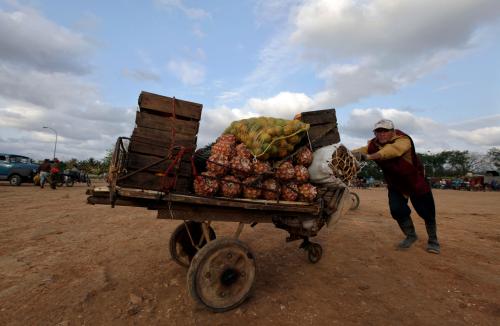The start of the 21st century has been an auspicious period for global economic development. In the 1990s, a mere 13 emerging economies succeeded in growing at a speed at least twice that of the OECD countries, enabling rapid convergence on Western living standards. By the first decade of the 2000s, this number had mushroomed to 83. Accelerated rates of economic growth lie behind many of the recent success stories in global development, not least the fulfilment of the first Millennium Development Goal to halve the global poverty rate, five years ahead of the 2015 deadline.
Yet in a number of places, growth has failed to take off, has undergone periodic reversals, or has benefited a few while leaving the majority short-changed.
Included here are the poor and stagnant economies Paul Collier had in mind when he coined the term the Bottom Billion. These are countries gripped by structural challenges to growth: handicapped by weak infrastructure and institutions, and prone to disaster, disease or conflict.
In the world’s resource-rich economies, the so-called commodity supercycle has spurred economic activity, but at a pace far exceeding improvements in institutions and governance. Such growth is unlikely to be sustained and, in many cases, its benefits are captured disproportionately by elites.
Even in some of the most dynamic emerging economies, persistent pockets of poverty remain in lagging sub-national regions, or among selected population groups, resulting from market and local governance failures, or discrimination and exclusion.
Ending extreme poverty over the next generation will require inclusive and sustained growth across the developing world, and the private sector—partnering ever more effectively with both donor and developing country governments—has an essential role to play in enabling this growth to occur.
Next week, global leaders, entrepreneurs, practitioners and public intellectuals will come together at the Brookings Blum Roundtable to debate how inclusive growth can be jump-started in the most difficult environments. Among the topics for discussion are: how to improve dialogue between governments and private corporations; what assurances investors look for to operate in high-risk and conflict settings; what promise new technologies hold for leapfrogging physical infrastructure; what it takes to unlock mega investment deals; how to transform and diversify resource-dependent economies; and whether the U.S. government’s new approach to working in partnerships can advance global development prospects.
Information on this year’s roundtable— including associated policy briefs, blogs, tweets and more—can be found at: https://www.brookings.edu/bbr. You can also follow the conversation on Twitter by checking @BrookingsGlobal for live tweets or seeing what roundtable participants are saying at the hashtag #Blum2014.






Commentary
The 2014 Brookings Blum Roundtable: Jump-starting Inclusive Growth in the Most Difficult Environments
July 31, 2014